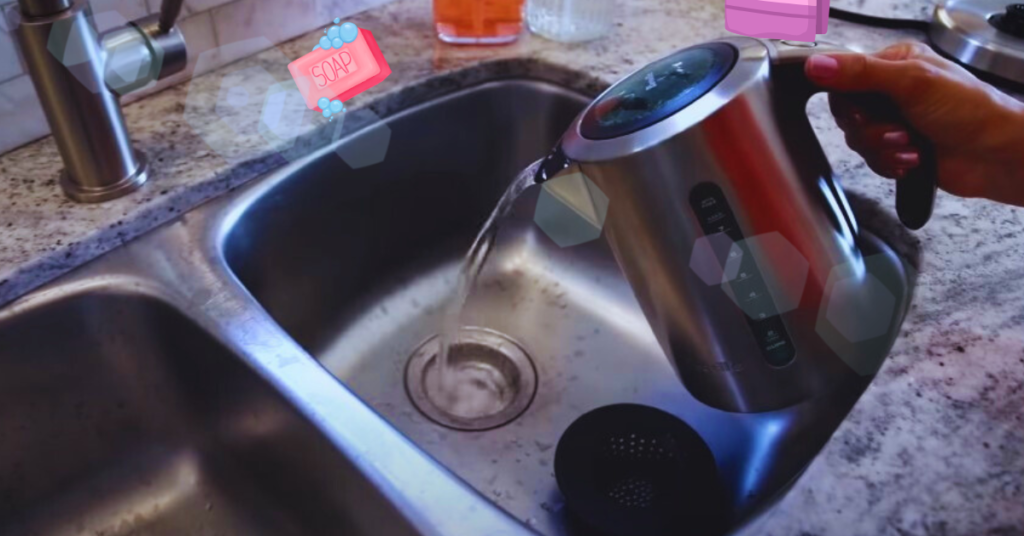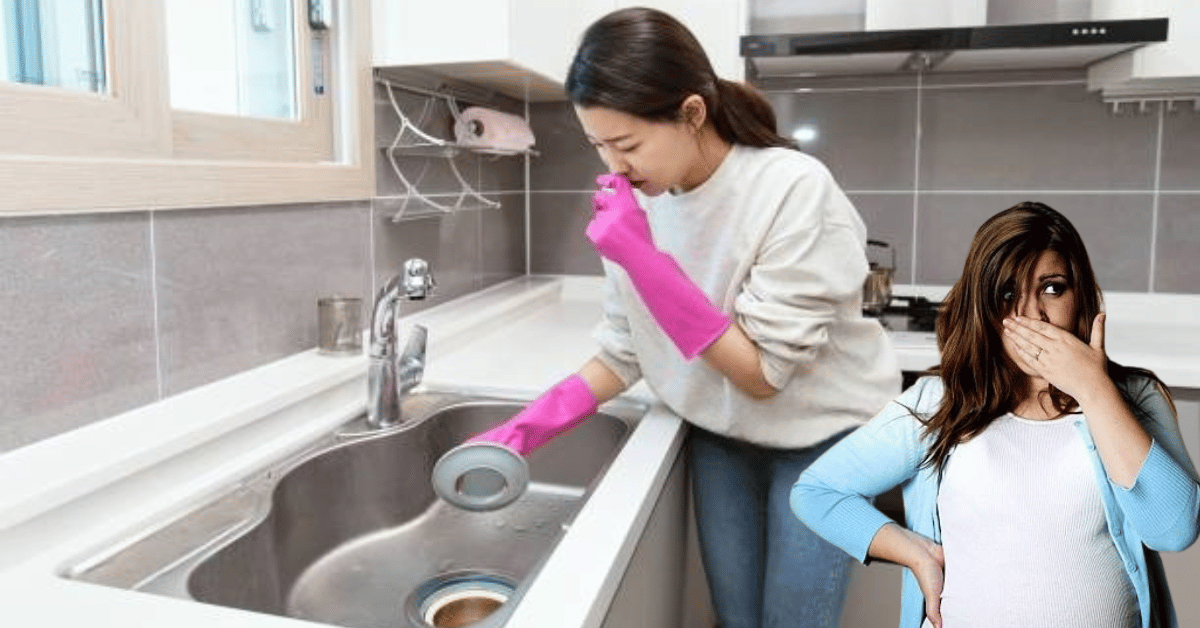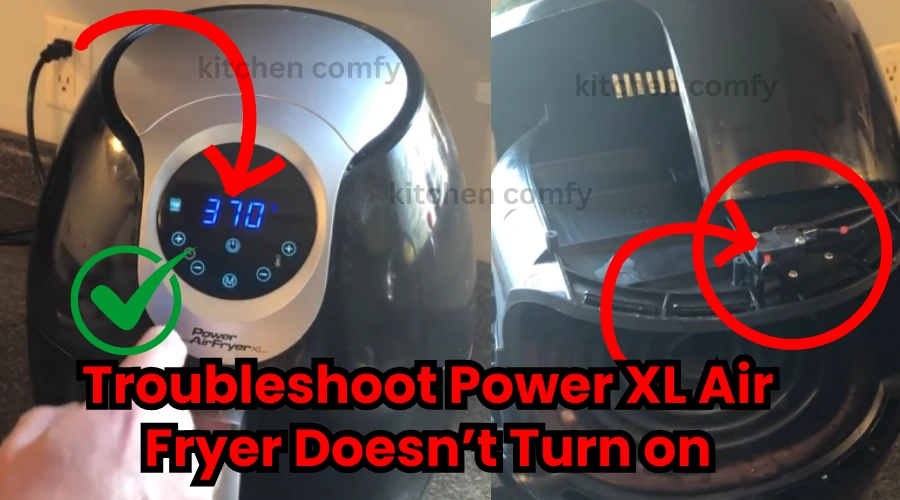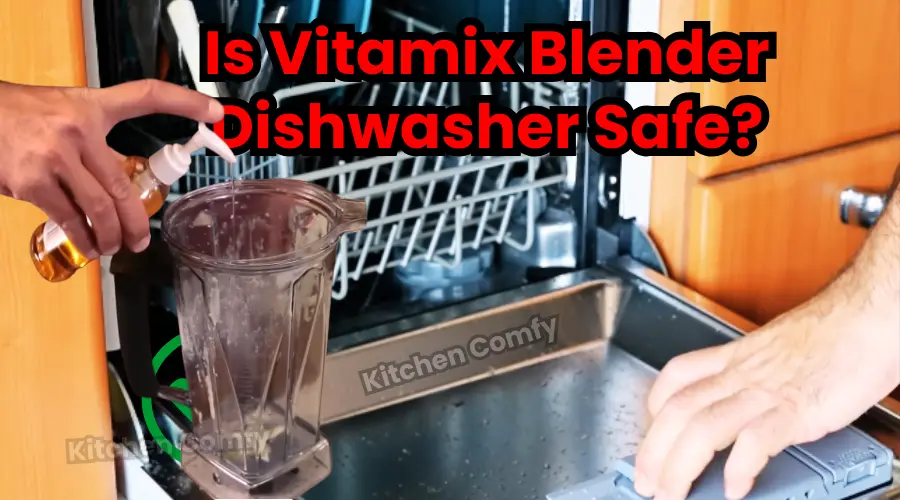When you enter your kitchen, the kitchen sink drain smells bad, and you feel very unhappy with these bad odors. Are you grappling with the chronic hassle of unsightly odors emanating from your kitchen sink drain? The unwelcome fragrance that arises when your kitchen sink drain smells horrific. It can genuinely put a damper on your culinary endeavors. But retaining a kitchen that exudes a clean and attractive aroma is a long way from being a superficial subject. It is about fashioning an environment conducive to exciting cooking studies.
In this blog post, we’re talking about the infamous problem of kitchen sink drain odors head-on. Our challenge is crystal clear: to equip you with pragmatic and robust solutions. Not only to vanquish those bothersome odors but also to make sure that your kitchen becomes a bastion of pleasant scents. And a hub of heat for all to take pleasure in.
Why does the kitchen sink drain smell bad?
Ever wonder why your kitchen sink sometimes smells really bad? It’s usually because of yucky stuff building up in the pipes. Food scraps, grease, and other gross things can get stuck and start to rot, making your sink stink.
Also, if the water sits in the bendy pipe under the sink (called the P-trap), it can get smelly too because bacteria like to hang out there. Plus, mold and mildew can grow in wet, dark places, adding to the stench.
Don’t worry, there are easy fixes! Pouring hot water mixed with vinegar or baking soda down the drain can help eliminate the stink and gunk. You can also use special cleaners that break down the gross stuff and keep your sink smelling fresh. Just clean your sink regularly to keep it from smelling bad again.
The kitchen sink drain smells bad for poor drainage system:
The poor drainage system can be a reason why your kitchen sink drain smells bad. If your drainage system is not working well, there high possibility to smell bad.ᅠ
When water drains slowly, it can lead to the buildup of bits of food, grease, and other things inside the pipes. These leftovers can start to rot and create a bad smell. Additionally, when water doesn’t flow properly, it doesn’t carry away these particles as it should, allowing them to stick around and produce an unpleasant odor over time. So, slow drainage doesn’t just cause water to accumulate, but it also gives rise to the stinky problem.
DIY Solutions for Banishing Kitchen Sink Drain Odors
Regular Cleaning and Maintenance:
Keeping your kitchen sink drain clean is crucial to preventing those unpleasant odors. Over time, bits of food, grease, and debris can accumulate in the drain, leading to bad smells. Regular cleaning helps avoid this buildup and maintains a fresh-smelling kitchen.
Step-by-Step Guide for Cleaning the kitchen sink drain smell:
- Gather Supplies: You’ll need some basic household items such as baking soda, vinegar, a pot of boiling water, a cleaning brush, and a cloth.
- Remove Debris: Start by removing any visible debris from the drain using a brush or your fingers. Be sure to wear gloves for hygiene.
- Baking Soda Application: Pour about half a cup of baking soda down the drain. Let it sit for a few minutes; it’ll help absorb odors and loosen buildup.
- Vinegar Treatment: After the baking soda, pour a cup of vinegar down the drain. The mixture will fizz and bubble, working to break down any remaining residue.
- Boiling Water Flush: Boil a pot of water and carefully pour it down the drain. The hot water will help wash away the loosened debris and the cleaning mixture.
- Final Rinse: Run cold water for a minute or two to flush out any remaining particles and ensure the drain is clean.
- Baking Soda and Vinegar as Natural Cleaning Solution: Baking soda and vinegar are natural alternatives to chemical cleaners and can effectively eliminate odors. Baking soda absorbs smells, while vinegar’s acidic properties help dissolve buildup. The fizzing reaction between them helps dislodge gunk from the drain’s walls. This eco-friendly solution not only cleans but also leaves your drain smelling fresh.
By following these simple steps and incorporating routine cleaning into your kitchen maintenance, why does the kitchen sink drain smells bad, you can get rid. Regular upkeep will not only keep your kitchen smelling pleasant but also ensure a healthier environment for your culinary endeavors.
Clearing Blockages and Improving Drainage
Introducing Plunger and Plumber’s Snake:
When faced with a clogged kitchen sink drain, tools like a plunger or plumber’s snake can be incredibly helpful. A plunger creates pressure to dislodge blockages, while a plumber’s snake is a flexible tool that navigates through pipes to break down and remove stubborn obstructions.
Cleaning the P-Trap for Smooth Drainage:
The P-trap, a U-shaped pipe beneath your sink, often collects debris and causes slow drainage or odors. Here’s how to clean it:
- Gather Tools: Get a bucket, pliers, and an old toothbrush.
- Prep Work: Place the bucket beneath the P-trap to catch any water and debris.
- Loosening Connections: Use pliers to carefully loosen the nuts connecting the P-trap to the pipes. Be ready for some water to come out.
- Emptying and Cleaning: Remove the P-trap and empty its contents into the bucket. Use the toothbrush to scrub away grime and buildup.
- Reassembly: Reattach the P-trap, tighten the nuts, and ensure everything is secure.
- Flushing: Run water through the drain to ensure proper drainage and check for leaks.
Tips to Prevent Future Blockages:
- Dispose of Wisely: Avoid putting large food scraps, grease, and coffee grounds down the drain. Dispose of them in the compost or trash.
- Use Drain Guards: Install drain guards to catch food particles and hair, preventing them from entering the pipes.
- Regular Hot Water Flush: Once a week, pour boiling water down the drain to help melt away grease and small debris.
- Baking Soda and Vinegar Maintenance: Use the baking soda and vinegar method mentioned earlier as a regular maintenance routine to prevent buildup.
By utilizing tools like plungers and plumber’s snakes, cleaning the P-trap, and adopting preventative measures, you can effectively clear blockages and maintain a smoothly flowing, odor-free kitchen sink drain. Consistent care and attention will ensure that your kitchen remains a fresh and functional space for all your culinary adventures.
Advanced Techniques to Eliminate Persistent Odor:

Using Hot Water and Steam to Get Rid of Odors:
- How Hot Water and Steam Help: Hot water and steam can work wonders in getting rid of those pesky odors coming from your kitchen sink drain. The heat from the hot water helps to break down the gunk that might be causing the stink.
- How to Use Hot Water Safely: First, boil some water until it’s nice and hot. Let it cool down just a bit so it’s not too crazy hot. Then, pour it down the drain slowly and carefully. This helps avoid any sudden shocks to your pipes.
- Adding a Nice Smell with Essential Oils or Citrus Peels: If you want to make things even better, you can drop a bit of essential oil, like lemon or orange, down the drain. Or, toss in some citrus peels. When the hot water and steam hit them, they’ll release a nice, fresh scent.
Enzyme cleaners and friendly bacteria in the kitchen sink
What’s Up with Enzyme-Based Cleaners: These special cleaners use natural enzymes to break down the stuff causing the smells, like bits of food and grease. They target the root of the problem, so those stinky odors don’t stand a chance.
How Enzyme Cleaners Do Their Thing: Enzymes are like little helpers that speed up certain chemical processes. Enzyme cleaners have these helpful enzymes that chow down on the gunk, turning it into simpler stuff that’s easy to wash away. This way, they get rid of the real cause of the smells.
Being Nice to the Environment with Bacterial Treatments: Another cool option is using bacteria to tackle those odors. These good bacteria munch on the organic stuff, breaking it down and preventing that nasty smell from coming back.
So, if you’re tired of dealing with stubborn kitchen sink odors, giving hot water and steam, enzyme cleaners, or friendly bacteria a try might just make your kitchen a much happier place to be!
Prevention and Long-Term Odor Control Habit
- Why Proper Waste Disposal Matters: One key to keeping your kitchen smelling fresh is to handle food waste responsibly. When we do this, we prevent the buildup of gunk that causes those unpleasant odors.
- Using a Sink Strainer: Here’s a handy tip: get a sink strainer. It’s like a little net for your drain. It catches all those food bits that might otherwise clog your pipes. Empty it out regularly and save yourself from potential kitchen sink disasters.
- Say No to Pouring Grease: Pouring grease down the drain might seem harmless, but it’s a major contributor to bad smells. Grease solidifies in pipes and causes blockages. Instead, let the grease cool down and then toss it in the trash. Your pipes and your nose will thank you.
Keeping Things Clean with Regular Maintenance
- Creating a Maintenance Schedule: Think of your drain as needing a spa day every now and then. Set up a schedule for regular cleaning. This way, you won’t have to deal with sudden surprises and persistent odors.
- Monthly Cleaning Routine: Make it a habit to do a deep clean once a month. Use the baking soda and vinegar method or the hot water treatment mentioned earlier. It’s a little effort that goes a long way in keeping your kitchen smelling good.
- Consistency is the Key: By sticking to your maintenance routine, you’re making sure those nasty odors stay away. Regular cleaning helps maintain a fresh-smelling kitchen, making your cooking and cleanup experiences much more pleasant.
So, remember to dispose of waste properly, use a sink strainer, avoid pouring grease down the drain, and set up a regular maintenance schedule. These small habits will go a long way in ensuring a delightful atmosphere in your kitchen.
Conclusion
Dealing with Kitchen Sink Odors: In our adventure to conquer unsightly sink odors, we’ve got explored various answers. From regular cleaning and waste disposal to superior techniques like warm water treatments and enzyme cleaners, we’ve blanketed a huge variety of strategies.
Keeping a Fresh Kitchen: A clean sink drain isn’t just about removing bad smells; it’s about a healthier and more enjoyable cooking space. Debris buildup leads to unwanted odors, affecting your home’s overall atmosphere.
Take Action for a Better Home: To combat this, use the tips we’ve discussed. By adopting these practices, you can transform your kitchen into a fresher, more inviting space. Say goodbye to those bothersome odors and welcome a renewed kitchen ambiance.
Your Fresh Kitchen Awaits: Put these tips into action. With a bit of effort, you can eliminate sink odors and welcome a revitalized kitchen. Your culinary haven is within reach
FAQs
Q: What causes kitchen sink drain odors?
A: Kitchen sink drain odors are often caused by food particles, grease, soap scum, and bacterial growth in the drain.
Q: Can I use chemical drain cleaners to eliminate odors?
A: While chemical cleaners can be effective, they may also harm the environment and your plumbing. Consider using natural alternatives like baking soda and vinegar.
Q: How often should I clean my kitchen sink drain?
A: Regular maintenance is essential. Clean the drain at least once a month to prevent odors from developing.
Q: Why is proper waste disposal important for odor control?
A: Proper waste disposal prevents debris from accumulating in the drain, which can lead to foul odors.
Q: Are enzyme cleaners safe for the environment?
A: Yes, enzyme cleaners are biodegradable and eco-friendly, making them a safe option for both your plumbing and the environment.
Related Posts

JAKARIA is a seasoned expert in kitchen appliances and cooking techniques. With years of hands-on experience and in-depth knowledge, he has a knack for solving common kitchen appliance issues. He also offers expert guidance to help you achieve culinary success and create amazing meals effortlessly.



![Can You Put a Paper Plate in an Air Fryer – [Best Alternatives]](https://kitchencomfy.com/wp-content/uploads/2025/01/can-you-put-a-paper-plate-in-an-air-fryer.webp)
![6 Ways to Fix Ninja Creami Blade Not Going Down [Solved]](https://kitchencomfy.com/wp-content/uploads/2025/01/ninja-creami-blade-not-going-down.webp)